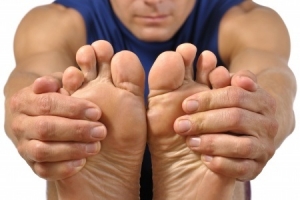Connect With Us
Blogs
Displaying items by tag: ingrown nails
June is Older Americans Month
At Superior Foot & Ankle Care Center we know that foot care needs change as you age. This week we’d like to address some foot health care needs that are particularly important for our more senior patients in honor of Older Americans Month.
Work with Your Podiatrist—there are several foot ailments that are more likely to develop as you age, such as arthritis and certain nerve issues. Your feet may also be the first place that systemic disorders such as diabetes or circulatory dysfunction show up. For these reasons, it’s important to maintain a regular schedule of checkups with our podiatrists, Dr. Victoria Foley and Dr. Constance Omelas. This will enable the foot doctor to spot changes in your feet and also help you manage chronic foot issues and keep them from becoming debilitating.
Shoe Sense—good shoes are important at any age but for senior patients, the right shoe can prevent falls and keep foot disorders from worsening. Have your foot professionally measured at a quality shoe store. It is not unusual for your shoe size to increase as you get older. Buy shoes that have good arch and ankle support and a gripping tread on the bottom. Shoes with laces give a better fit than Velcro. For dress shoes, keep heels to no higher than 2 inches. Replace shoes when they become stretched out or damaged.
Develop a Daily Foot Care Regimen—wash your feet every day and dry completely. Check your feet for any changes in skin or nails, cuts, bruises, growths or any other unusual symptoms. Keep toenails trimmed straight across and not too short to avoid ingrown nails. Apply moisturizer or foot powder as needed.
Good Habits for Life—many of the lifestyle choices that are healthy for the rest of your body have a positive impact on your feet too. Don’t smoke—it impedes circulation. Exercise regularly to increase bone strength and maintain range of motion. Keep your weight down because extra pounds put more stress on joints and bones in your lower extremities.
Keeping your feet healthy during your senior years isn’t difficult. To learn more about how to ensure that your feet will enable you to live a long, active life, contact our Long Beach office by calling: (562) 420-9800.
Hidden Risk for Men with Diabetes
Did you know that when it comes to self care for patients with diabetes that men are far less likely than women to follow the podiatrist’s instructions? In honor of Men’s Health Month we at Superior Foot & Ankle Center want share some important ways that men (and the women who love them) can greatly reduce their risk of serious diabetic foot complications.
One of the biggest health threats for diabetic patients is an open wound or ulcer. Due to poor circulation and decreased immune system function even seemingly minor cuts or injuries can rapidly become major problems. Infections can develop that are very difficult to heal, leading to serious debilitation and even amputation. To reduce the risk of injury and infection, follow these tips:
Inspect your feet daily: since diabetic patients often have nerve damage which makes it difficult to perceive pain and other sensations, visual examination of the feet becomes very important. If you notice any unusual bumps, red spots, blisters, changes in color, size or shape of the foot you should let our podiatrists, Dr. Victoria Foley and Dr. Constance Omelas know ASAP.
Don’t go barefoot: wearing some type of footwear will reduce the risk of toenail and skin infections since these are transmitted by direct contact. You will also decrease the chances of injuring your foot by banging into something or stepping on a sharp object.
Practice good hygiene: wash your feet daily with warm (not hot) water and a mild soap. Be sure to dry thoroughly, especially between the toes, to help prevent athlete’s foot. Sweat glands can also be affected by diabetes. If feet are dry, be sure to apply a rich moisturizer to prevent cracking. Patients who sweat excessively should use a foot powder to help keep feet dry.
Prevent ingrown nails: keep toenails trimmed short and straight across—curved edges can grow down and back into the skin around the nail bed, opening a doorway for bacteria. If you do develop an ingrown nail, don’t attempt any “bathroom surgery!” Allow the podiatrist to take care of the nail.
Following these simple steps can greatly reduce the risk of disability and health issues from diabetes. If you have questions or are experiencing any unusual symptoms in your feet contact our Long Beach office for an appointment by calling: 562-420-9800.
Don’t Let Diabetes Slow You Down
Meet Joe Plank: He’s 81 years old and loves to skateboard! A Long Beach resident, Joe works as a grief counselor at the VA, helps autistic children in the county of Orange and enjoys lots of activities with his daughter and her family. Joe also has diabetes. As a patient of Superior Foot & Ankle Care Center, we see Joe as living proof that diabetes doesn’t have to stop you from living a full and (very!) active life.
One of the best ways to help control your blood sugar is through exercise. In addition, many diabetic patients suffer from neuropathy and circulation issues. Exercise is an excellent way to keep the blood flowing. Before skateboarding, Joe was an enthusiastic surfer for more than 6 decades. Although the activities that you choose may change over time, it’s important to make exercise and fitness a lifelong habit. Our board certified foot and ankle surgeons, Dr. Victoria Foley and Dr. Constance Omelas can make recommendations of activities and footwear that would best suit your feet and ankles. Your podiatrist can also tell you other ways to help take care of your feet if have diabetes. A few items that should be on your daily foot care regimen checklist include:
- Wash feet with a mild soap and warm (not hot) water. Dry completely, especially between the toes (to help prevent athlete’s foot).
- Inspect your feet, toes and ankles for changes. Look for swelling, cuts, bruising, changes in color, shape or size, bumps, rashes or blisters. Report anything unusual to the foot doctor immediately.
- Apply a rich moisturizer to keep feet supple and prevent skin and heel cracks.
- Keep toenails cut straight across and not too short to prevent ingrown nails from developing.
If you want to learn more about diabetic care and how to maintain an active lifestyle with this disease, contact our Long Beach office. And, be sure to wave to Joe if you see him skate boarding at Huntington Beach Pier. Remember, as Joe says, “Being a geezer is a conscious choice.”



